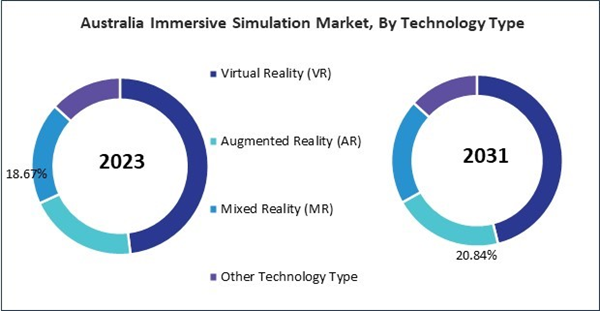The China market dominated the Asia Pacific Immersive Simulation Market by country in 2023, and is expected to continue to be a dominant market till 2031; thereby, achieving a market value of $3.76 billion by 2031. The Japan market is registering a CAGR of 30.6% during 2024-2031. Additionally, the India market is expected to showcase a CAGR of 32.3% during 2024-2031.
In healthcare, these simulations allow medical professionals to perform surgeries or practice emergency medical procedures in a virtual environment. The ability to replicate surgeries using VR or AR, with real-time feedback and haptic feedback devices, can significantly improve patient safety and medical outcomes. These simulation technologies in healthcare extend beyond medical training to include therapeutic applications, diagnostics, and patient care.
VR is being used to treat mental health conditions like anxiety, PTSD, and phobias by creating controlled, virtual environments in which patients can confront their fears and anxieties in a safe, monitored space. For physical therapy, immersive simulations can help patients recover from injuries by guiding them through exercises and monitoring their progress in virtual environments.
India’s EdTech sector is expanding at an unprecedented pace, positioning the country as the global EdTech capital. With 25 million children born every year, the preschool sector alone is projected to grow to $7.35 billion by 2028, at a compound annual growth rate (CAGR) of 11.2% from 2023 to 2028. Furthermore, India is home to 7 of the 36 global EdTech unicorns, collectively valued at $34.05 billion as of June 2022. China’s virtual reality (VR) industry is undergoing a remarkable transformation, attracting substantial investment and financing as market players capitalize on the growing demand for high-tech solutions. With over 10,000 VR-related firms currently operating, the technology is being applied across various domains, including industry, culture, and education. The Chinese government’s plan to cultivate 100 top enterprises with strong innovation capabilities and increase VR sales to over 25 million units highlights its commitment to the sector’s growth. In conclusion, The rapid growth of India’s EdTech sector and China’s burgeoning VR industry is accelerating the development of the market in Asia.
List of Key Companies Profiled
- Microsoft Corporation
- Meta Platforms, Inc.
- Magic Leap, Inc.
- IBM Corporation
- NVIDIA Corporation
- Autodesk, Inc.
- Lockheed Martin Corporation
- Siemens AG
- EON Reality, Inc.
- Sony Corporation
Market Report Segmentation
By Application
- Training & Learning
- Product Development
- Emergency Services
- Sales & Marketing
- Other Application
By Component
- Hardware
- Software
- Services
By Technology Type
- Virtual Reality (VR)
- Augmented Reality (AR)
- Mixed Reality (MR)
- Other Technology Type
By Industry
- Media & Entertainment
- Aerospace & Defense
- Education
- Gaming
- Manufacturing
- Automotive
- Healthcare
- Retail & E-commerce
- Other Industry
By Country
- China
- Japan
- India
- South Korea
- Australia
- Malaysia
- Rest of Asia Pacific
Table of Contents
Companies Mentioned
- Microsoft Corporation
- Meta Platforms, Inc.
- Magic Leap, Inc.
- IBM Corporation
- NVIDIA Corporation
- Autodesk, Inc.
- Lockheed Martin Corporation
- Siemens AG
- EON Reality, Inc.
- Sony Corporation









